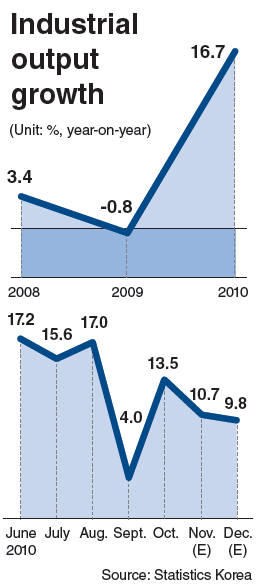Data shows recovery on track, adds pressure for rate increase
Korea’s industrial output grew for the 18th straight month in December, suggesting the economic recovery remains on track and adding to the case for the central bank to raise borrowing costs again.
According to the report by Statistics Korea, production in the mining and manufacturing industries expanded 9.8 percent last month from the same month a year earlier. The output has expanded since July 2009.
Production grew 2.8 percent from the previous month. For all of 2010, it jumped 16.7 percent from a year earlier, the report showed.

The increase is attributed to brisk output in the semiconductor and machinery equipment sectors, whose production expanded on-year 19.6 percent and 20.3 percent, respectively. This more than offset sluggish performances in the computer and transportation equipment sectors.
“Industrial production had remained in a slump in 2009 in the wake of the economic crisis but recovery in exports and the manufacturing sector, along with a 6.1 percent growth last year, contributed to the fast rebound in output figures,” said Yoon Jong-won, head of the finance ministry’s economic policy bureau.
The report showed that local manufacturing plants operated at 82.5 percent of capacity on average in December, a 1.6 percentage point increase from the month before. For 2010, the average factory utilization rate stood at 81.8 percent, up 7.2 percentage points from a year earlier.
However, the leading economic composite index, a gauge of economic performance eight to 15 months ahead, fell 0.2 percentage points from a month earlier, marking the 12th straight month of contraction.
Facility investment inched up 0.2 percent from a month earlier, while construction orders plunged 20.8 percent from the year before, hard-hit by sluggish property markets.
Meanwhile, the service sector output expanded 1.3 percent from November and 2.1 percent from a year earlier, the report showed. For 2010, the output increased 3.7 percent.
In a separate report, the Finance Ministry said that it will “closely” monitor economic conditions at home and abroad as many uncertainties linger, including debt problems in some European countries and rising raw material prices.
Korea has stepped up measures to pare currency gains to keep exports competitive, spurring economic growth and pushing inflation toward the central bank’s 4 percent ceiling. The Bank of Korea reviews policy Feb. 11 after joining Thailand and India in extending interest-rate increases this month, acting the same day the government announced price controls.
Korea’s economy expanded 0.5 percent in the three months through December from the previous quarter, when it grew 0.7 percent. For the whole of 2010, gross domestic product increased 6.1 percent, the fastest pace since 2002.
Bank of Korea Governor Kim Choong-soo and the policy board raised the base rate by a quarter of a percentage point in January to 2.75 percent, adding to increases of the same amount in July and November from a record low.
(From news reports)








